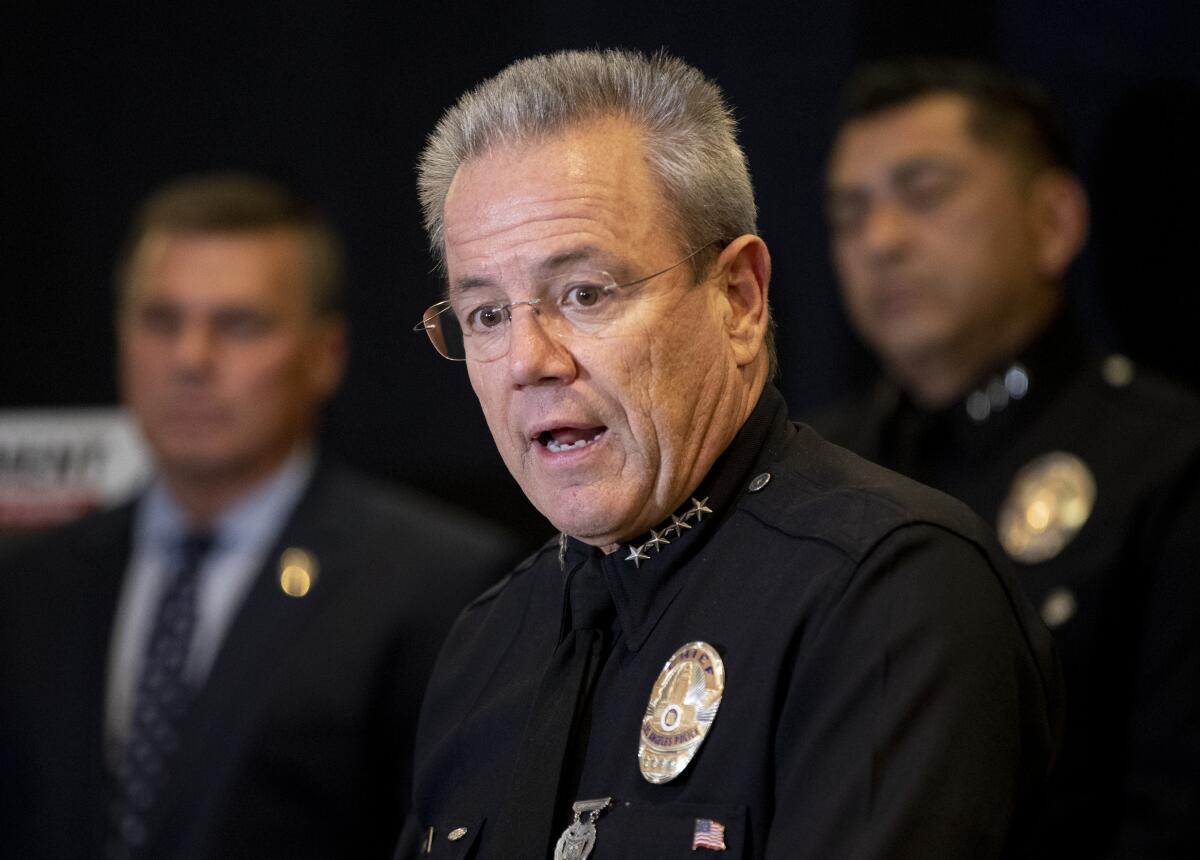L.A. council members want to give the police chief more power to fire officers for misconduct

Two members of the Los Angeles City Council called Friday for an overhaul of the Police Department’s disciplinary process, one that would enhance the police chief’s power to fire officers and scale back the involvement of civilians in disciplinary hearings.
The proposal, authored by Councilmembers Tim McOsker and Hugo Soto-Martinez, would eliminate the department’s practice of allowing civilians to fill all three seats on a Board of Rights, a panel that reviews LAPD disciplinary cases and then renders a decision.
Both men said that system, created as part of the 2017 ballot measure known as Charter Amendment C, has been more lenient toward officers than the more traditional disciplinary panels, which featured one civilian and two LAPD command officers.
“We’ve had the system for the past two years, and we have clearly seen it’s not working,” Soto-Martinez said. “ It’s not holding police officers accountable.”
Friday’s proposal was spearheaded by something of a political odd couple at City Hall: McOsker is an attorney who previously represented the Los Angeles Police Protective League, the rank-and-file officers union, which originally pushed for Charter Amendment C.
The board that reviews his disciplinary decisions is overly lenient, he says.
Soto-Martinez is a self-described abolitionist who has called for the eventual elimination of L.A.’s current system of policing, saying it should be replaced by services that focus on “the actual root causes of crime.”
Both men were elected in November. Both have called for an ordinance repealing the system of all-civilian disciplinary panels.
“The data tells us that it was not an effective reform,” said McOsker, who helped advocate for Charter Amendment C seven years ago.
Two months ago, Police Chief Michel Moore issued a letter reporting that all-civilian disciplinary panels were regularly rejecting his recommendation that officers lose their jobs, even when they found those officers guilty of misconduct. In 2020, for example, 12 officers who were targeted for removal asked for their cases to be reviewed by all-civilian panels. Although all 12 were found guilty, only three lost their jobs, the chief said.
The union’s board of directors said it was disappointed by the proposal, arguing the entire department is already overseen by a five-member commission made up of civilians chosen by the mayor. In a statement, the union also argued that police chiefs have misused the Board of Rights process by “injecting favoritism, settling scores and wrongly targeting officers for discipline.”
“Civilian hearing examiners simply leveled the playing field and Chief Moore doesn’t like that,” the union said.
McOsker and Soto-Martinez said they are also pushing to change the disciplinary system so that Moore can fire police officers immediately in severe cases, instead of waiting until after a Board of Rights has rendered its decision.
Under the LAPD’s current system, the chief can recommend the firing of an officer for misconduct, but does not actually have the power to terminate. Instead, when the chief believes firing is necessary, the officer is entitled to a hearing before a Board of Rights, which then conducts a hearing behind closed doors in which the officer and department officials present evidence and call witnesses.
“I think everyone understands that in the egregious cases ... the chief of police should be able to fire an officer,” McOsker said.
LAPD disciplinary panels historically have featured two members of the LAPD command staff and a civilian. Charter Amendment C allowed the council to pass a law that lets police officers accused of wrongdoing opt for an entirely civilian Board of Rights. The council can also repeal that law without returning to voters.
Get the lowdown on L.A. politics
Sign up for our L.A. City Hall newsletter to get weekly insights, scoops and analysis.
You may occasionally receive promotional content from the Los Angeles Times.
When Charter Amendment C was proposed, then-Council President Herb Wesson argued that more citizen involvement would produce a “fair” process. Community groups denounced the idea, warning that civilians would be more forgiving of police misconduct.
Moore seemed to agree with that assessment, telling The Times in 2020 that the current system “always seems to default in favor of the officer.” The chief argued that he should have more power to fire officers accused of violating policy or engaging in misconduct.
The LAPD’s union said Friday that it would oppose efforts to give the police chief an “unfettered ability” to terminate officers without due process.
“We will be actively engaged in publicly disclosing why this is a bad idea and is ripe for cronyism and corruption,” the union’s board said in its statement.
Times staff writer Libor Jany contributed to this report.
More to Read
Sign up for Essential California
The most important California stories and recommendations in your inbox every morning.
You may occasionally receive promotional content from the Los Angeles Times.











